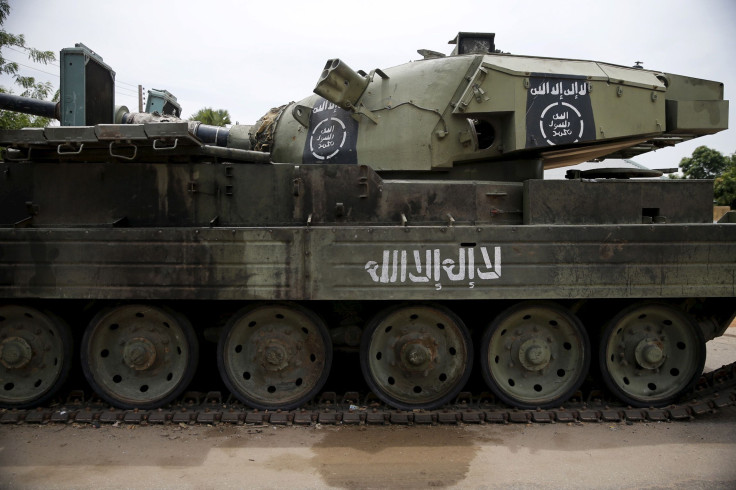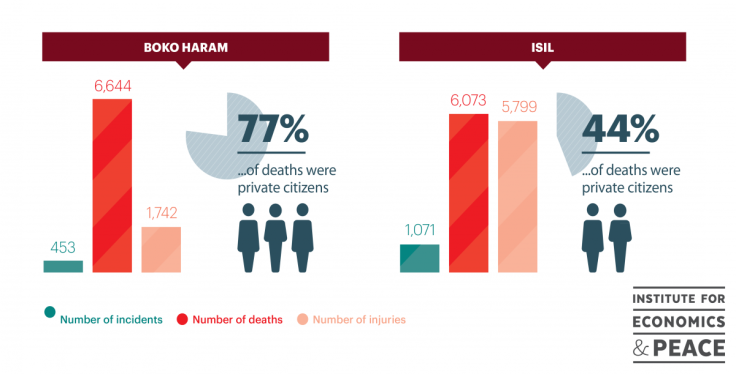Boko Haram More Deadly Than ISIS, With Massacres That Dwarf Paris Attacks And San Bernardino Shooting

The Islamic State group has garnered international headlines the past couple of years for coordinating and inspiring deadly rampages around the world, recently in Paris and in San Bernardino, California. The extremist group’s West African affiliate, Boko Haram, has arguably captured less media attention and yet it has carried out comparable attacks, sometimes on a weekly basis, as the Los Angeles Times reported.
While the Islamic State group, formerly known as either ISIL or ISIS, was reportedly responsible for 6,073 deaths in 2014, Nigeria’s homegrown Islamic terrorist organization was even more deadly, accounting for 6,644 fatalities, a 300 percent increase over the previous year. Together, the Islamic State group and Boko Haram caused 51 percent of all deaths related to claimed terrorist attacks worldwide last year, according to the Global Terrorism Index published by the Institute for Economics and Peace, a global think tank headquartered in Sydney. Northeastern Nigeria, the birthplace of Boko Haram, was the deadliest place to live in terms of terrorism.
Pledging allegiance to the Islamic State group in March, Boko Haram has overwhelmingly targeted civilians, with ambushes in quiet villages and suicide bombings in crowded marketplaces. In contrast, the Islamic State group has inflicted more deaths on the battlefield than through terrorism.

The Islamic State group published in mid-December an infographic indicating Boko Haram had launched more than 100 attacks in the previous two months. Posted on social media, the graphic also suggested the Nigeria-based militants had killed more than 1,000 people from Oct. 14 to Dec. 12. These attacks purportedly included 120 rocket firings and 67 suicide bombings.
Since launching its Islamic insurgency in northeastern Nigeria six years ago, Boko Haram has expanded its rampages into neighboring Cameroon, Chad and Niger. The Sunni militant group has killed about 20,000 people and displaced more than 2 million. Like the Islamic State group, Boko Haram seeks to establish a caliphate governed by Islamic law, aka Shariah.
While battling the Boko Haram insurgency at home, Nigeria is deciding whether to join a Saudi Arabia-led military alliance to fight the Islamic State group, which controls a great deal of territory in Iraq and Syria. U.S.-led coalitions have been bombing Islamic State group targets in both countries, while arming rebels fighting the jihadis on the ground in some cases.
Since taking office in late May, Nigerian President Muhammadu Buhari has vowed to crush Boko Haram. The Nigerian military has retaken much of the extremist group’s northern territory this year. Buhari said Nigeria has “technically won the war” on Boko Haram, saying the militants had been reduced to fighting with improvised explosive devices and were mostly limited to their heartland in Borno state in northeastern Nigeria.
“Articulated conventional attacks on centers of communication and populations ... they are no longer capable of doing that effectively,” Buhari told BBC News Thursday. “So I think technically we have won the war because people are going back into their neighborhoods. Boko Haram as an organized fighting force, I assure you that we have dealt with them.”
Still, the terrorist group is fighting back and has scaled up its attacks since Buhari took office. Most recently, suspected Boko Haram militants stormed Kimba village in Borno and killed 13 people, while abducting eight others Christmas Day.
“They burnt down our houses, killed our brothers and abducted our children,” a resident told Nigeria’s Daily Post newspaper Friday.
© Copyright IBTimes 2024. All rights reserved.




















